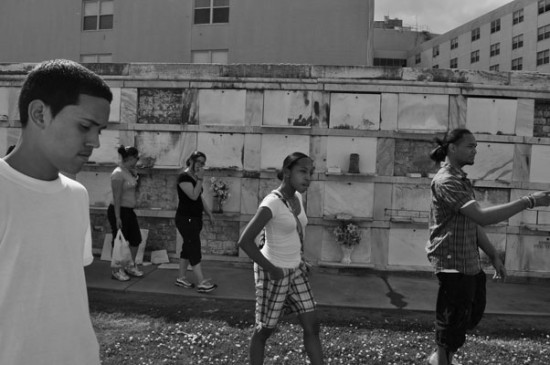
Students travel to New Orleans, reflect on the South Bronx
While most of their classmates slept in and hung out during their week-long spring break from Mott Haven Village Preparatory High School, Laurin Ellis, 18, was picking up a drill and installing dry wall. Jessica Colon, 17, was taking her very first canoe ride. Joanelly Fermin, 17, was cleaning up parks and helping to build benches.
“The first day back at school after break, everyone just kept asking us, ‘How was New Orleans, how was New Orleans?’” Fermin said. “It was like our greeting all day.”
The girls were among 12 juniors and seniors who participated in Village Prep’s first alternative spring break program. The students spent the first week of April in New Orleans, where they joined in efforts to help the city recover from Hurricane Katrina and explored the city’s culture.
The goal wasn’t just to show the kids New Orleans—it was to encourage them to think critically about how the city compares with their own.
“The idea was that New Orleans was being rebuilt, and it’s like starting a city over in some ways,” said teacher Daniel Abramoski. “In many ways, the Bronx could use some rebuilding.”
The trip was the idea of teacher Brendan Lowe. He and fellow teachers Abramoski and Maritza Montilla started fundraising and selecting interested students for the trip.
“We raised the funds, picked the students and then we realized it would be better for them to go in having some background info,” Abramoski said. “We wanted them to know what the Lower Ninth Ward is, what a levee is.”
So New Orleans became the subject of a special after-school class.
The 10 girls and two boys all knew about the destruction Hurricane Katrina had caused. But very few of them had ever thought about the factors that contributed to the disaster.
“I’ll admit, I was so embarrassed, I knew nothing,” Fermin said. “I was like, I’m gonna have to Google it before class starts.”
The class met for an hour and a half for 10 Mondays. Still, most of the students weren’t prepared for what they saw when they arrived in the city’s Lower Ninth Ward, which shares with the South Bronx the distinction of being the city’s poorest neighborhood and which suffered most from flooding when the hurricane crashed into the city five years ago.
“I was expecting it to be more alive,” said Gelene Laureano, 18. “It was shocking to see that there was really nobody there, that houses were still destroyed.”
The lesson was one they could never have learned in their classroom.
“You can read a book, and our teachers talked to us, yeah, but when you go there and actually see it,” said Fermin, her voice trailing off.
“We talked to this guy who went to Tulane, and we asked him what it was like during the hurricane and he started tearing up,” Laureano said, picking up Fermin’s train of thought. “It’s different to hear it from people who actually experienced it.”
The students spent their week exploring the Lower Ninth and building park benches, creating a nature trail and cleaning up the streets. They went canoeing in the Bayou Sauvage National Wildlife Refuge, and had their first taste of crawfish, gumbo and venison.
They also traded dance moves with New Orleans high schools students. While the students from Mott Haven will be breaking out a move called the dip at their prom, students in New Orleans now know all about Bachata, a dance popular in Dominican culture.
All of the experiences were aimed at what the teachers call “expanding their middle zone.” Often, Abramoski explained, students know what they love and know what they hate, but are hesitant to try any other opportunities.
“The middle zone is like, don’t judge a book by it’s cover,” Laureano said. “We don’t always want to be open minded. But a lot of the stuff we tried in New Orleans, we miss it now that we’re back.”
But they haven’t forgotten their experiences.
“I think being in New Orleans and helping out down there made us realize, if you have the means to do something, you should do it,” said Zeniah Issah, 17. “Don’t feel like it’s not your responsibility.”
And that means being more aware of what’s happening in their own community, the students said.
“Just seeing little things, like garbage on the subway or in the streets,” Issah said, “makes me not want to litter anymore.”
Their teachers are hoping to raise enough money to take another group of juniors and seniors back to New Orleans next year.
“Part of the reason this project was so powerful, and that students are making connections is simply because they’ve had the opportunity to, ” Abramoski said. “If there were more experiences like this, connections would be coming all the time.”
A version of this story appeared in the May 2010 issue of the Mott Haven Herald

[…] Green City, with stories by Carla Candia, Alex Green IV, Nick Loomis and Vishal Persaud. Meanwhile, Emily Lavin reported on a trip local students made to New Orleans to learn Katrina’s lessons and Hannah […]